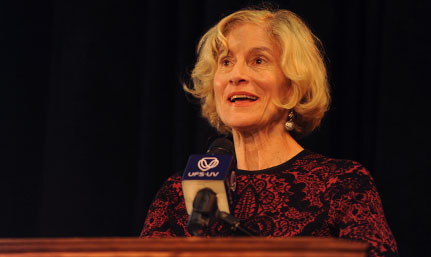Latest News Archive
Please select Category, Year, and then Month to display items
06 April 2018
Photo Rulanzen Martin
 From the left: Dr Thulisile Mphambukeli, leader of the BRICS research team that is exploring the political economy of water and food security, and her research partner, Dr Victor Okorie.
From the left: Dr Thulisile Mphambukeli, leader of the BRICS research team that is exploring the political economy of water and food security, and her research partner, Dr Victor Okorie.
A Brazil, Russia, India, China and South Africa (BRICS) delegation is to hold the 10th Annual BRICS Summit in the last week of May 2018 in Johannesburg. Dr Thulisile Mphambukeli, leader of the University of the Free State (UFS) research team alongside Dr Victor Okorie from the Department of Urban and Regional Planning, in collaboration with Prof Lere Amusan of North-West University, will ensure that water and food security is a prominent feature on the gathering’s agenda.
First, the project titled: “Exploring the political economy of water and food security nexus in BRICS and Africa” will debut at the National Institute for the Humanities and Social Sciences BRICS Think Tank Forum”.
According to Dr Mphambukeli, the key to water security is attitudinal change by means of education and conscientisation. This, she is adamant about, holds the potential to drive behavioural adjustments in the way society interacts with water.
Genetic and social approaches
Dr Okorie asserts that if strides towards reducing the demand for water were to be made, research efforts should be geared towards effecting changes at DNA level. Meaning we need to explore waterwise ways that enable crops and animals to thrive optimally.
The project also looks at social dimensions of water such as flushing a toilet. “Research activities on redesigning toilets, especially the urinal, where more than nine litres of water are used to flush less than one cubic centimetre of urine, are timely in the context of managing water and the food nexus crises,” said Dr Okorie.
Combining the genetic and social approaches would allow us to produce more with a smaller water footprint. This can be made possible by implementing precision agriculture which is about estimating and applying exact quantities of water and nutrients needed for the production of crops or the raising of livestock.
Paradigm shifting policies
Prof Amusan said the team intended to propose functional solutions that take the quality of water into consideration. Equitable production and distribution of water depends on endorsing policies of co-production between citizens, governments and the public sector. BRICS member states mutually consider water and food security as an issue of paramount significance, hence its feature on this prestigious summit’s agenda.
Prof. Martha Nussbaum visits Kovsies
2012-12-27
 |
Prof. Martha Nussbaum
Photo: Sonia Small
10 December 2012 |
The UFS community was privileged to gain insight into the brilliant mind of renowned philosopher Prof. Martha Nussbaum when she visited the Bloemfontein Campus.
Prof. Nussbaum, considered by some as one of the foremost living philosophers on the world stage, spent a week at the university interacting with staff, students and visitors from South Africa and abroad. The visit attracted huge interest, with people traveling from other parts of South Africa to hear Prof. Nussbaum speaking at public events held on the campus. International visitors attending the conference “Engaging the Other: Breaking Intergenerational Cycles of Repetition”on campus and scholars taking part in the Southern African Young Scientists Summer Program, also attended events.
Prof. Nussbaum’s first public event was on 6 December 2012 when the university honoured her with an honorary doctorate. She received a D. Litt degree for her intellectual and public contribution to human development. On 7 December 2012, she delivered a lecture on “Creating capabilities, the human development approach”. She also delivered a keynote address on the Political Role of the Arts as part of the conference on “Engaging the Other: Breaking Intergenerational Cycles of Repetition”.